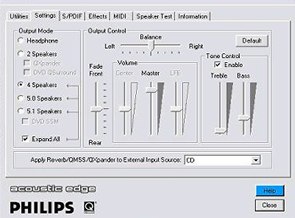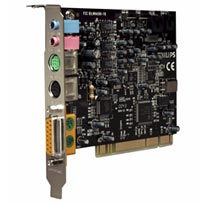On the cutting edge.
Riddle me this: What is the most underrated PC component as well as often being
the root of many driver incompatibility issues? It’s smaller than a bread box
and usually sounds better than Celine Dion. Give up? Well, it’s your PC sound
card!
|
Philips Acoustic Edge 5.1 |
Over the years we have seen and heard many sound cards – some great, some not
and many in between. Recently the most impressive board we’ve tested is easily
Hercules’ Game Theater XP. Loaded with extras,
the XP offers a multitude of functionality and top quality sound. A definite
high-end sound solution.
But many new boards threaten to usurp our current reigning champ. One of the
challengers comes from Philips, who’s no stranger to the audio/multimedia arena.
And unsurprisingly, the Philips Acoustic Edge Digital 5.1 channel surround
is a great sound card. Can it compete with our lovely XP? Do zombies
like brains?
I should note that currently, Hercules does not have any Windows XP drivers
for the Game Theater XP, which is surprising since the OS has been shipping
with most new computers for about a month now. In any event, I have been running
WinXp Professional and haven’t been able to use the Game Theater XP.
So my first concern regarding the Acoustic Edge was the OS support,
and Philips does not disappoint. They have you completely covered supporting
Windows 95, 98, ME, 2000 and XP.
Aesthetically speaking, the Acoustic Edge is nothing special. But its
cosmetic modesty is easily outweighed by its relentless power and efficiency.
Powered by Philips’ ThunderBird Avenger DSP digital signal processor, this puppy
works wonders for sound. You get 96 streams of 3D audio acceleration, 256 streams
of DirectSound acceleration, full-duplex, 48Khz digital recording, playback,
wavetable synthesis and FM synthesis.
What does all this mean? For the most part, it all facilitates some amazing
clarity. The overall sound quality is flawless, easily comparable to the Game
Theater XP. There is no background hiss or hum. The result is clear without
that tinny sound you get from some other sound cards. Solid audio quality is
what you can expect.
Manipulating sound is done with the Philips PSC706 Audio Control Panel. By
clicking the icon placed on your task bar you can access the concise and intuitive
utilities. Unfortunately, there is no real equalizer that allows you to save
different settings. This exclusion is shared with the Game Theater XP,
as well as my disappointment. Luckily, the bass and treble tones are balanced
well enough to suffice, and you can always download an equalizer off the Internet.
Yet still…sad face!
 What
What
you do get are bass and treble levers and a score of other sound options and
special effects somewhat akin to those found in the Sound
Blaster Live utility system – echo, reverb, Qxpander, multiple speaker setup
options, Sound Environmental Mapping for EAX and DirectSound and much more.
The software bundle just adds more audio goodness. Leading the package is a
full version of Interplay’s gorgeous DirectX 8 optimized Giants:
Citizen Kabuto (this beauty was also packed with our Gladiac
920 GF 3 – since I did the review for said game, I now have 3 maybe 4 copies
of this incredible title. You’d think it was Daikatana
or something, the way these guys are giving this game out.) Giants is
accompanied by Audio Pix, a software DVD decoder and the ever handy Siren
Jukebox (trial version, of course). Not bad!
No good sound card worth its weight is gonna ship without proper connectivity
options and the Acoustic Edge is no exception. Aside from the ubiquitous
gameport, mic, front, rear and middle speaker ports (don’t forget, this is a
5.1 surround solution), you also get Digital S/PDIF output and input (for all
you digital system owners) and an additional external line-in. Also, special
effects can be applied to all audio inputs, including conversion of stereo to
quadraphonic or 5.1 output, Qxpander, 2D-3D remapping and reverb.
So what you get is a 5.1 sound card that can supply quality 5.1 surround sound
to all movies, all games, and all music, backed by the tried and true Philips
name. The software bundle is satisfying, the sound quality is great, and the
$70 dollar price tag (even cheaper if you use our Pricegrabber
link) is easy on the wallet. You don’t get all the bells and whistles that
come with the Game Theater XP, but you do get WinXP support and
I have yet to experience any system incompatibilities. All this for nearly 100
bucks less than the GT XP? The Philips Acoustic Edge is a no-brainer.
-
Great sound
-
Loaded with options
-
5.1 surround for all media
-
Satisfying software bundle
-
Stable!
-
No equalizer











